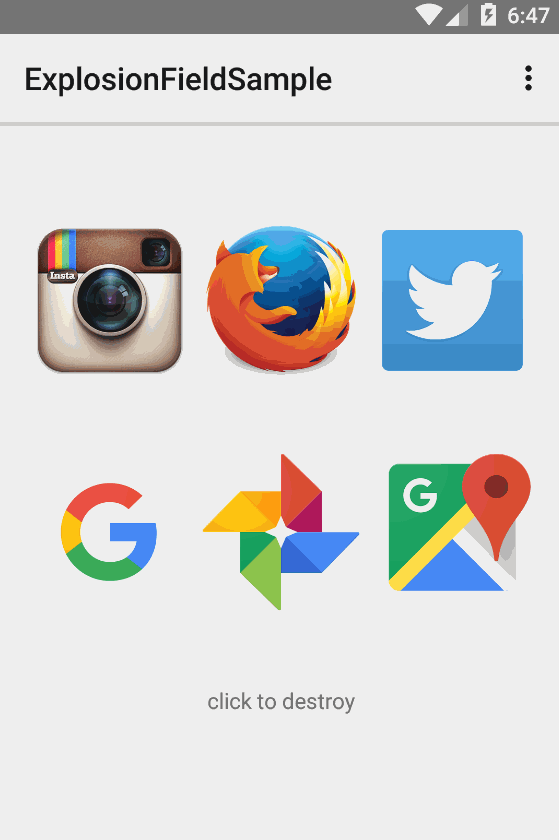Android仿小米卸载动画图标爆炸效果
前言
前一段事件接触到了小米手机的卸载动画。炫酷效果,瞬间爆炸好吗?好奇心也瞬间爆炸,凭什么我们的图标就只能移来移去,秉着不服气的心情,我决定仔细研究研究它是怎么爆炸的。
正文
上面说了很多次图标爆炸,那到底是怎么爆炸的呢?我们来看效果。

使用动画
已经有大神为我等菜鸟封装好了git远程引用库,这样很方便就可以使用图标爆炸功能。
在module的buildGradle添加内容
dependencies {compile 'tyrantgit:explosionfield:1.0.1'}
在程序中调用
//实现爆炸动画mExplosionField = ExplosionField.attach2Window(this);mExplosionField.explode(v);
怎么样,是不是很!简!单!
动画实现原理
那么这看起来如此炫酷的动画到底是如何实现的呢?我们知道调用mExplosionField.explode(v);可以实现爆炸动画。而explode方法是ExplosionField类为我们提供的一个方法它本身又继承于View。首先export方法有什么内容:
public void explode(final View view) {Rect r = new Rect();//getLocalVisibleRect(Rect r)方法可以把视图的长和宽映射到一个Rect对象上。view.getGlobalVisibleRect(r);int[] location = new int[2];//获取当前坐标getLocationOnScreen(location);//使矩形与view重叠r.offset(-location[0], -location[1]);r.inset(-mExpandInset[0], -mExpandInset[1]);//执行view抖动的动画int startDelay = 100;ValueAnimator animator = ValueAnimator.ofFloat(0f, 1f).setDuration(150);animator.addUpdateListener(new ValueAnimator.AnimatorUpdateListener() {Random random = new Random();@Overridepublic void onAnimationUpdate(ValueAnimator animation) {view.setTranslationX((random.nextFloat() - 0.5f) * view.getWidth() * 0.05f);view.setTranslationY((random.nextFloat() - 0.5f) * view.getHeight() * 0.05f);}});animator.start();//隐藏view动画view.animate().setDuration(150).setStartDelay(startDelay).scaleX(0f).scaleY(0f).alpha(0f).start();//执行真正的炸裂动画explode(Utils.createBitmapFromView(view), r, startDelay, ExplosionAnimator.DEFAULT_DURATION);}
可以看到,export方法中无非就是将VIew映射到一个矩形中,然后做抖动动画。其中:
explode(Utils.createBitmapFromView(view), r, startDelay, ExplosionAnimator.DEFAULT_DURATION);才是真正调用完成爆炸的功能。
public void explode(Bitmap bitmap, Rect bound, long startDelay, long duration) {final ExplosionAnimator explosion = new ExplosionAnimator(this, bitmap, bound);explosion.addListener(new AnimatorListenerAdapter() {@Overridepublic void onAnimationEnd(Animator animation) {mExplosions.remove(animation);}});explosion.setStartDelay(startDelay);explosion.setDuration(duration);mExplosions.add(explosion);explosion.start();}
在这个方法中,重点内容就是ExplosionAnimator类的实例化。这个类是一个继承ValueAnimator的类,它实现了爆炸动画的主要内容。
public class ExplosionAnimator extends ValueAnimator {static long DEFAULT_DURATION = 0x400;private static final Interpolator DEFAULT_INTERPOLATOR = new AccelerateInterpolator(0.6f);private static final float END_VALUE = 1.4f;private static final float X = Utils.dp2Px(5);private static final float Y = Utils.dp2Px(20);private static final float V = Utils.dp2Px(2);private static final float W = Utils.dp2Px(1);private Paint mPaint;private Particle[] mParticles;private Rect mBound;private View mContainer;public ExplosionAnimator(View container, Bitmap bitmap, Rect bound) {mPaint = new Paint();mBound = new Rect(bound);int partLen = 15;mParticles = new Particle[partLen * partLen];Random random = new Random(System.currentTimeMillis());int w = bitmap.getWidth() / (partLen + 2);int h = bitmap.getHeight() / (partLen + 2);for (int i = 0; i < partLen; i++) {for (int j = 0; j < partLen; j++) {//GetPixel,函数功能,该函数检索指定坐标点的像素的RGB颜色值。mParticles[(i * partLen) + j] = generateParticle(bitmap.getPixel((j + 1) * w, (i + 1) * h), random);}}mContainer = container;setFloatValues(0f, END_VALUE);setInterpolator(DEFAULT_INTERPOLATOR);setDuration(DEFAULT_DURATION);}private Particle generateParticle(int color, Random random) {Particle particle = new Particle();particle.color = color;particle.radius = V;if (random.nextFloat() < 0.2f) {//2 - 5particle.baseRadius = V + ((X - V) * random.nextFloat());} else {//1 - 2particle.baseRadius = W + ((V - W) * random.nextFloat());}float nextFloat = random.nextFloat();//0.2 - 0.38particle.top = mBound.height() * ((0.18f * random.nextFloat()) + 0.2f);//0.2 - 0.236 : 0.4 - 0.58particle.top = nextFloat < 0.2f ? particle.top : particle.top + ((particle.top * 0.2f) * random.nextFloat());//bottom可能是x轴位移偏移总量//-0.9 - 0.9particle.bottom = (mBound.height() * (random.nextFloat() - 0.5f)) * 1.8f;float f = nextFloat < 0.2f ? particle.bottom : nextFloat < 0.8f ? particle.bottom * 0.6f : particle.bottom * 0.3f;particle.bottom = f;particle.mag = 4.0f * particle.top / particle.bottom;particle.neg = (-particle.mag) / particle.bottom;f = mBound.centerX() + (Y * (random.nextFloat() - 0.5f));particle.baseCx = f;particle.cx = f;f = mBound.centerY() + (Y * (random.nextFloat() - 0.5f));particle.baseCy = f;particle.cy = f;particle.life = END_VALUE / 10 * random.nextFloat();particle.overflow = 0.4f * random.nextFloat();particle.alpha = 1f;return particle;}public boolean draw(Canvas canvas) {if (!isStarted()) {return false;}for (Particle particle : mParticles) {particle.advance((float) getAnimatedValue());if (particle.alpha > 0f) {mPaint.setColor(particle.color);mPaint.setAlpha((int) (Color.alpha(particle.color) * particle.alpha));canvas.drawCircle(particle.cx, particle.cy, particle.radius, mPaint);}}mContainer.invalidate();return true;}@Overridepublic void start() {super.start();mContainer.invalidate(mBound);}private class Particle {float alpha;int color;float cx;float cy;float radius;float baseCx;float baseCy;float baseRadius;float top;float bottom;float mag;float neg;float life;float overflow;//根据属性动画进度,来获得小圆点当前属性public void advance(float factor) {float f = 0f;float normalization = factor / END_VALUE;//这里设定当小圆点动画进行到进度,也就是大于或者小于某一个临界值时,置为透明。if (normalization < life || normalization > 1f - overflow) {alpha = 0f;return;}//计算出在可显示区间的进度normalization = (normalization - life) / (1f - life - overflow);//计算此时应有的值float f2 = normalization * END_VALUE;//当进度超过0.7f时,使小圆点开始变透明。if (normalization >= 0.7f) {f = (normalization - 0.7f) / 0.3f;}alpha = 1f - f;//小圆点下一个位移点f = bottom * f2;cx = baseCx + f;cy = (float) (baseCy - this.neg * Math.pow(f, 2.0)) - f * mag;radius = V + (baseRadius - V) * f2;}}}
以上为ExplosionAnimator类的所有代码,也是实现爆炸动画的主要内容。在其内部存在一个内部类Particle,该类盛放了一个小圆点的所有属性信息。ExplosionAnimator类的实例化过程中将传入的view映射的矩形依照像素为颜色分解成15*15个小圆点将其属性数据存储在Particle实例中,通过generateParticle()方法使得小圆点按照一定的比例获得不同的属性值,决定之后的运动轨迹以及透明度变化。
现在已经搞清楚,图标是怎么变成很多个小球的了,最后来看看,小球运动的动画如何实现。
在上面我们有看到ExplosionAnimator实例化之后紧接着调用了start()方法。这就要看到ExplosionField类的onDraw()方法了。
protected void onDraw(Canvas canvas) {super.onDraw(canvas);for (ExplosionAnimator explosion : mExplosions) {explosion.draw(canvas);}}
其中主要内容便是调用了explosion.draw(canvas);
public boolean draw(Canvas canvas) {if (!isStarted()) {return false;}for (Particle particle : mParticles) {particle.advance((float) getAnimatedValue());if (particle.alpha > 0f) {mPaint.setColor(particle.color);mPaint.setAlpha((int) (Color.alpha(particle.color) * particle.alpha));canvas.drawCircle(particle.cx, particle.cy, particle.radius, mPaint);}}mContainer.invalidate();return true;}
这个方法才真正实现了对view映射的矩形进行操作,根据getAnimatedValue()动画的进度来进行小圆点状态的刷新,从而实现爆炸动画。
总结
爆炸动画的实现,其实就是一个属性动画的灵活运用,使用属性动画为我们提供一个动画进度,利用再view的刷新机制去完成动画效果。
源码地址:
https://github.com/tyrantgit/ExplosionField
到这里就结束啦。
